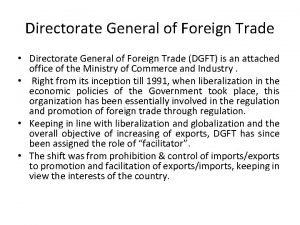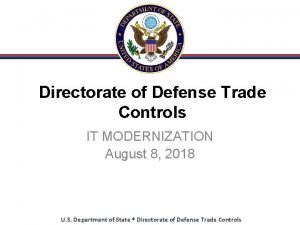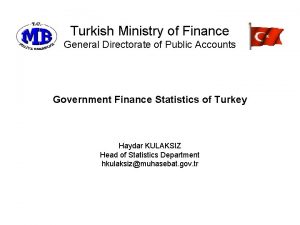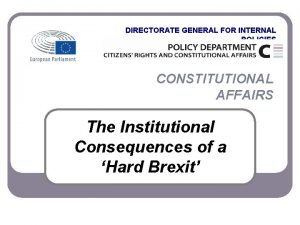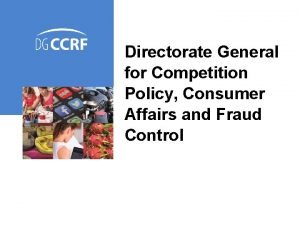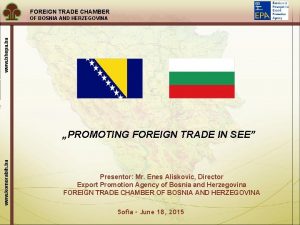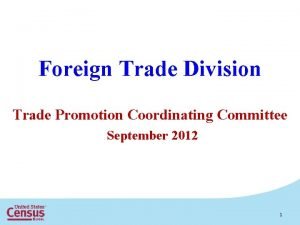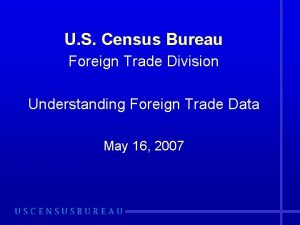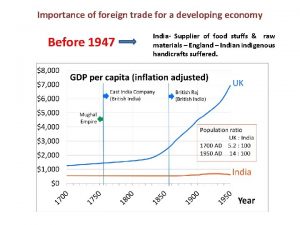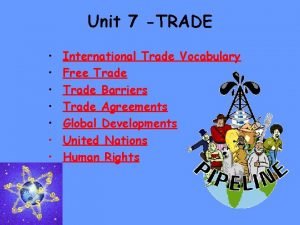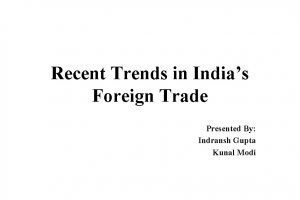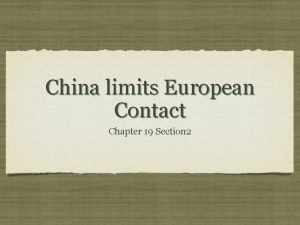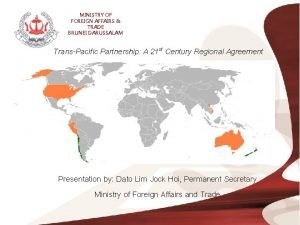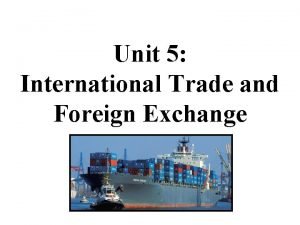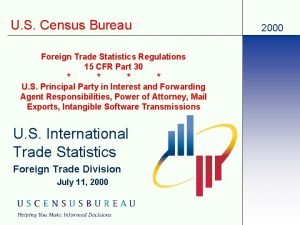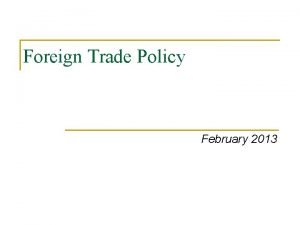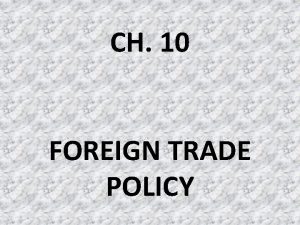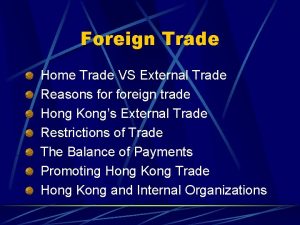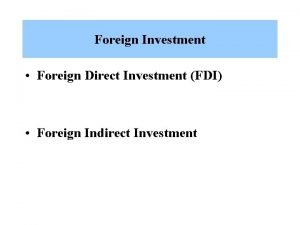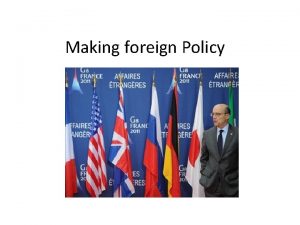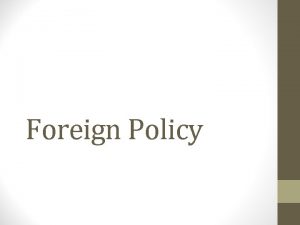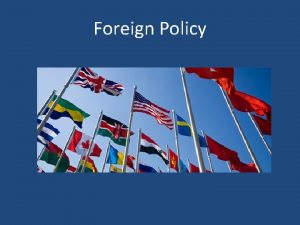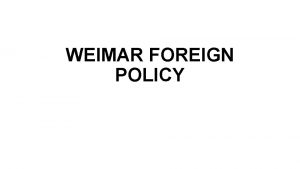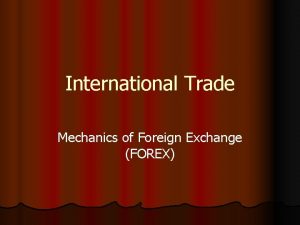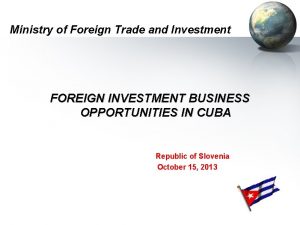Directorate General of Foreign Trade Directorate General of


















- Slides: 18

Directorate General of Foreign Trade • Directorate General of Foreign Trade (DGFT) is an attached office of the Ministry of Commerce and Industry. • Right from its inception till 1991, when liberalization in the economic policies of the Government took place, this organization has been essentially involved in the regulation and promotion of foreign trade through regulation. • Keeping in line with liberalization and globalization and the overall objective of increasing of exports, DGFT has since been assigned the role of “facilitator”. • The shift was from prohibition & control of imports/exports to promotion and facilitation of exports/imports, keeping in view the interests of the country.

Role of Regional Authority of DGFT • DGFT headquartered at New Delhi, is responsible for implementing the FTP with the objective of promoting India’s exports. • DGFT issues licenses /authorizations to exporters & importers and monitors their corresponding obligations through a network of 37 regional offices and extension counters at Indore. • The List of 37 RAs and 7 Development Commissioners of Special Economic Zones is at Appendix 1 -A • All regional offices provide facilitation to exporters in regard to developments in International Trade i. e. WTO agreements, Rules of Origin and antidumping issues, etc to help exporters in their import and export decisions in an internationally dynamic environment. • RAs of DGFT monitor Scrips issued under various schemes of FTP, issues authorization, invalidation letters, advance release orders, decides admissibility of drawbacks etc.

What is export promotion Export promotion is: • promoting; • supporting ; • assisting firms in entering international markets; & • achieving optimum opportunities from their international business activities. • Thus, aim of Export Promotion is encouraging exports. • In order to provide guidance and assistance to an exporter, the Government of India has setup several institutions, one of them is Export promotion council(EPC)

Export Promotion Councils • Export Promotion Councils (EPCs) are organizations of exporters, set up with the objective to promote and develop Indian exports. • These Councils are registered as non-profit organizations under the Companies Act/ Societies Registration Act. • Each Council is responsible for promotion of a particular group of products/ projects/services as given in Appendix 2 T of AANF • All exporters of products, coming under the purview of council, are entitled to become member of the council. • EPCs do not provide financial or other type of direct assistance. The members have to pay an annual subscription fee for the services rendered to them by the council.

FUNCTIONS / ROLES OF EPCs • • • The Councils perform both advisory and executive functions. Role and functions are guided by Foreign Trade Policy 2015 -20 EPCs are eligible to function as Registering Authorities to issue Registration-cum-Membership Certificate (RCMC) to its members. The criteria for EPCs to be recognized as Registering Authorities for issue of RCMC to its members are detailed in Para 2. 92 of the Handbook of Procedures (2015 -20). By acting as registering authority under the import policy for registered exporters, it helps them in expanding overseas market for their products.

Criteria for EPCs as Registering Authorities • In order to make EPCs truly democratic and participative in nature and for better governance and transparency, criteria for them to function as Registering Authority are as under: • e-Voting: Electronic Voting would be mandatory for election to the posts of Vice Chairman/Vice President & Executive Committee members with a view to ensuring wider participation • Tenure of Elected Heads: Tenure of an elected head shall not be for more than two years. The election of Chairman/President of the EPC shall be via Vice Chairman/Vice President route. • Directions of the Central Government: EPCs acting as Registering Authorities shall abide by all directions of Central Govt. in respect of promotion and development of international trade

Registering-cum-Membership. Certificate (RCMC) • All members are given Registrations-Cum-Membership Certificate (RCMC) for their respective EPCs. • This certificate is for securing benefits of various concessions and incentives offered by the Govt. for export promotions • An exporter may, on application given in ANF 2 C register and become a member of EPC. • On being admitted applicant shall be granted RCMC, in format given in Appendix 2 R. • Prospective / potential exporters may also, on application, register and become an associate member of an EPC.

Provisions for RCMC • Para 2. 56 of Foreign Trade Policy: Any person, applying for: (a) An Authorisation to import/export (except items) listed as ‘Restricted’ items in ITC (HS) Or (b) Any other benefit or concession under FTP shall be required to furnish or upload on DGFT’s website in the Importer Exporter Profile, the RCMC granted by competent authority in accordance with procedure specified in HBP, unless specifically exempted under FTP. • Certificate of Registration as Exporter of Spices (CRES) issued by Spices Board shall be treated as Registration-Cum-Membership Certificate (RCMC) for the purposes under this Policy.

Applying for RCMC • While applying for RCMC, an exporter has to declare his main line of business in the application. • The exporter is required to obtain RCMC from the Council which is concerned with the product of his main line of business. • In case an export product is not covered by any EP/Commodity Board etc. , RCMC in respect thereof is to be obtained from FIEO. • Further, in case of multi product exporters, not registered with any EPC, where main line of business is yet to be settled, the exporter has an option to obtain RCMC from Federation of Indian Exporters Organization (FIEO). • In respect of multi product exporters having their head office/ registered office in the North Eastern States, RCMC may be obtained from Shellac & Forest Products Export Promotion Council (except for the products looked after by APEDA, Spices Board and Tea Board). • In respect of exporters of handicrafts and handloom products from the State of Jammu & Kashmir, Director, Handicrafts, Government of Jammu & Kashmir is authorised to issue RCMC.

Procedure for Issue of RCMC & its Validity • An application for registration may be made to the concerned Registering Authority in the form given in the prescribed Aayaat and Niryaat form, along with: (i) a self certified copy of the IEC number (ii) and bank certificate in support of the applicant’s Financial soundness. • If the application for registration is granted, the concerned registering authority issues the RCMC indicating the status of the applicant as Merchant Exporter or manufacturer Exporter. • In case an exporter desires to get registration as a manufacturer exporter, he is required to furnish evidence in that effect. • Validity of RCMC: The RCMC shall be deemed to be valid from 1 st April of the licensing year to in which it was issued and shall be valid for 5 years ending 31 st march of the licensing year, unless otherwise specified

Responsibility of the RCMC holder • Intimation Regarding Change in Constitution of Business : (a) In case of change in ownership, constitution, name or address of an exporter, it shall be obligatory on the part of RCMC holder to intimate such change to registering authority within a period of one month from date of such change. (b) Exporter shall furnish quarterly return /details of his exports of different commodities to concerned registering authority. • De- Registration : Registering authority may de-register an RCMC holder for a specified period for violation of conditions of registration. RCMC holder shall be given a show cause notice, to make a representation against the proposed de-registration. Upon de– registration, concerned EPC shall intimate the same to all RAs • Appeal Against De-registration Person aggrieved by a decision of registering authority in respect of any matter connected with issue of RCMC, may prefer an appeal to DGFT within 45 days against said decision and decision of appellate authority shall be final.

Functions of EPCs-i • Providing information: To assist exporters to understand, interpret and implement the export policies and export assistance schemes of Government. • Providing assistance: To provide assistance in export promotional activities such as external publicity, participation in fairs and exhibitions, promotion of exclusive exhibitions and trade fairs of specific products. 1 • Collecting data: To collect complete data on export growth, the problems faced by exporters, the specific help needed by the manufacturers and present the same to the Government in order to enable it to evolve appropriate export policies.

Functions of EPCs-ii • Acting as liaison: To carry on an effective liaison with industry and trade in order to identify the problems in export activities. • Sending trade delegations: To make arrangements for sending trade delegations and study teams to one or more countries for promoting the export of specific products and to circulate the reports of specific products and diversifying to new products. • Opening office abroad: To open offices abroad to help exporters in consolidating the existing exports and diversifying to new products. • Motivating exporters: To create consciousness among exporters through seminars, discussion and to motivate them for export promotion. • Co-operation with EIC: To provide co operation to the export inspection council on quality control and pre shipment inspection of export goods.

Functions of EPCs-iii • Disposing applications: To provide assistance to members for speedy disposal of export assistance applications • Offering guidance: To offer guidance to member on various matters like utilization of GSP, export finance, insurance of goods and joint ventures aboard. • Indicating export opportunities: To collect and supply market information to exporter and thereby to help them to take benefits of export opportunities available abroad. • Settling disputes: To help the member in settling their trade disputes through peaceful negotiations. • Concessions: To assist members in getting freight and other concessions for shipping conferences. • Issuing certificate of origin: To issue certificate of origin to Indian exporters certifying the origin of goods.

EPCs under Commerce and Industry • Engineering Export Promotion Council • Project Exports Promotion Council of India • Basic Chemicals, Pharmaceuticals and Cosmetics Export Promotion Council • Chemicals and Allied Products Export Promotion Council • Council for Leather Exports Promotion • Sports Goods Export Promotion Council • Gem and Jewellery Export Promotion Council • Shellac Export Promotion Council • Cashew Export Promotion Council • Plastics Export Promotion Council • Export Promotion Council for EOUs, SEZ Units • Pharmaceutical Export Promotion Council

EPCs Under Textile Industry • • • Apparel Export Promotion Council Carpet Export Promotion Council Cotton Textile Export Promotion Council for Handicrafts Handloom Export Promotion Council The Indian Silk Export Promotion Council Synthetic & Rayon Textile Export Promotion Council Wool & Woolens Export Promotion Council Powerloom Development & Export Promotion Council

EPCs Under Commodity Board Rubber Board Coffee Board Tea Board Tobacco Board Spices Board Central Silk Board under the Ministry of Textiles Coir Board under Ministry of Agro & Rural Industries • All India Handlooms and Handicrafts Boards under Ministry of Textiles • •

Autonomous bodies of EPC- Export Development Authorities • Marine Products Export Development Authority • Agricultural and Processed Food Products Export Development Authority • National Agricultural Cooperative Federation of India Ltd. (NAFED)
 Directorate general of foreign trade
Directorate general of foreign trade Deccs help desk
Deccs help desk Here you are too foreign for home
Here you are too foreign for home General directorate of animal health and production
General directorate of animal health and production Turkey ministry of finance
Turkey ministry of finance Directorate-general for internal policies
Directorate-general for internal policies Directorate general for competition
Directorate general for competition Bhepa
Bhepa Trade definition
Trade definition Foreign trade regulations ftr
Foreign trade regulations ftr Foreign trade division us census bureau
Foreign trade division us census bureau Chapter 14 section 1 the search for spices
Chapter 14 section 1 the search for spices Importance of foreign trade
Importance of foreign trade Comparative advantage worksheet with answers
Comparative advantage worksheet with answers Trends in india foreign trade
Trends in india foreign trade Chapter 19 section 2 china limits european contacts
Chapter 19 section 2 china limits european contacts Ministry of foreign affairs and trade brunei darussalam
Ministry of foreign affairs and trade brunei darussalam Unit 5 international trade
Unit 5 international trade Routed export transaction
Routed export transaction
